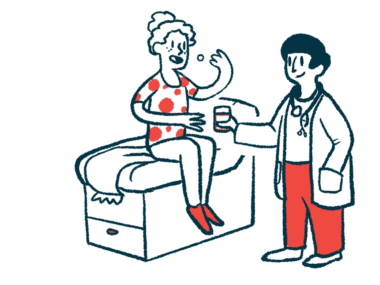New telitacicept deal aims to advance MG therapy outside China
Remegen, Vor Bio sign agreement for development, marketing of B-cell therapy
Written by |

Vor Bio has signed an exclusive license agreement to develop and market Remegen’s telitacicept — a B-cell-targeting candidate for the treatment of myasthenia gravis (MG) and other autoimmune diseases driven by self-reactive antibodies — outside of China, Hong Kong, Macau, and Taiwan.
Telitacicept has been approved since the end of May by Chinese regulators as an add-on treatment for adults with generalized MG who are positive for antibodies targeting the acetylcholine receptor (AChR), the most common antibodies known to drive the disease.
A global Phase 3 clinical study called RemeMG (NCT06456580) is underway to support the potential approval of telitacicept in both the U.S. and the European Union, where it has been named an orphan drug. RemeMG may still be recruiting patients at study sites across the U.S., Europe, and South America. Initial data are expected in the first half of 2027.
“I am absolutely thrilled to be leading Vor Bio as we transform the company to become a major player in autoimmune disease treatment,” Jean-Paul Kress, MD, the company’s newly appointed CEO and chairman, said in a press release from Puretech Health, which partly owns Vor Bio.
Immune B-cells normally produce antibodies to help the body fight infections. In MG, however, they also produce autoantibodies that react against AChR or other proteins on muscle cells, preventing them from receiving proper signals from nerve cells. This causes symptoms such as muscle weakness and fatigue.
Telitacicept is designed to simultaneously block BLyS (also called BAFF) and APRIL, two proteins that help B-cells survive and develop. By blocking these proteins, telitacicept is expected to reduce the numbers of disease-causing antibodies, easing symptoms.
“Targeting BAFF/APRIL signaling with telitacicept represents a significant advancement in addressing autoantibody-driven diseases, which is highly differentiated from other modalities in this space,” said Kress, who added that the company’s goal is to “[make] a meaningful impact for patients living with autoimmune diseases around the world.”
For telitacicept rights, Vor Bio will pay Remegen $125M upfront
Telitacicept’s approval in China drew on data from a completed Phase 3 clinical study (NCT05737160) involving 114 adults with generalized MG, in which muscle weakness occurs in varying parts of the body. The participants were randomly assigned to receive either telitacicept or a placebo as a weekly subcutaneous, or under-the-skin, injection for about six months.
After the six months, patients treated with telitacicept showed a 4.8-point improvement on the MG Activities of Daily Living (MG-ADL) scale, a measure of how much the disease interferes with daily activities, compared with the placebo. Telitacicept was also found to be safe and well tolerated.
The ongoing RemeMG study is recruiting up to 180 adults with a diagnosis of generalized MG who are positive for antibodies targeting the AChR or muscle-specific kinase (MuSK). As in the previous clinical study, the main goal is to watch for changes in MG-ADL scores with telitacicept versus the placebo over six months.
The strategic out-licensing of telitacicept’s ex-China rights accelerates our mission to deliver this innovative therapy to patients worldwide and will help maximize telitacicept’s clinical and commercial potential on the global scale.
Under the license agreement, Vor Bio will pay Remegen $125 million upfront. This includes $45 million in cash and $80 million in stock warrants. Remegen could also receive more than $4 billion in future payments if telitacicept reaches certain development and regulatory milestones, as well as royalties on potential future sales.
“Today marks a transformative milestone for Remegen and the global development of telitacicept,” said Jianmin Fang, PhD, Remegen’s CEO. “The strategic out-licensing of telitacicept’s ex-China rights accelerates our mission to deliver this innovative therapy to patients worldwide and will help maximize telitacicept’s clinical and commercial potential on the global scale.”
In China, telitacicept is also approved for two other autoimmune diseases driven by B-cells and autoantibodies: systemic lupus erythematosus — the most common form of lupus — and rheumatoid arthritis.




Leave a comment
Fill in the required fields to post. Your email address will not be published.